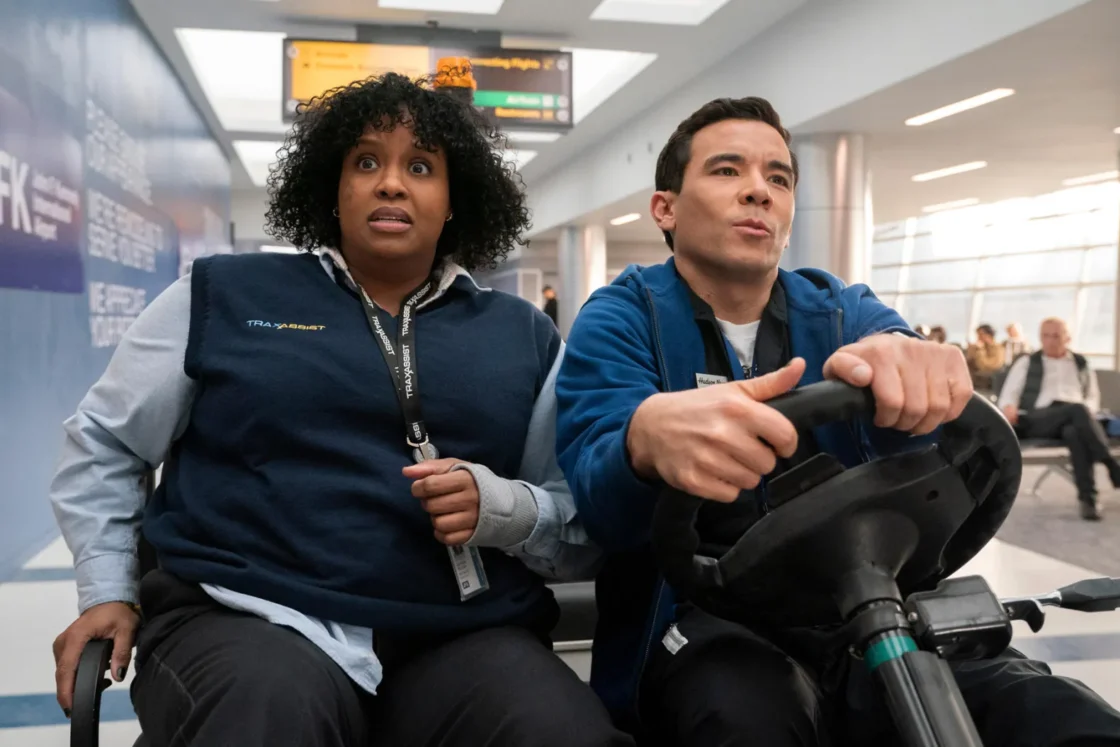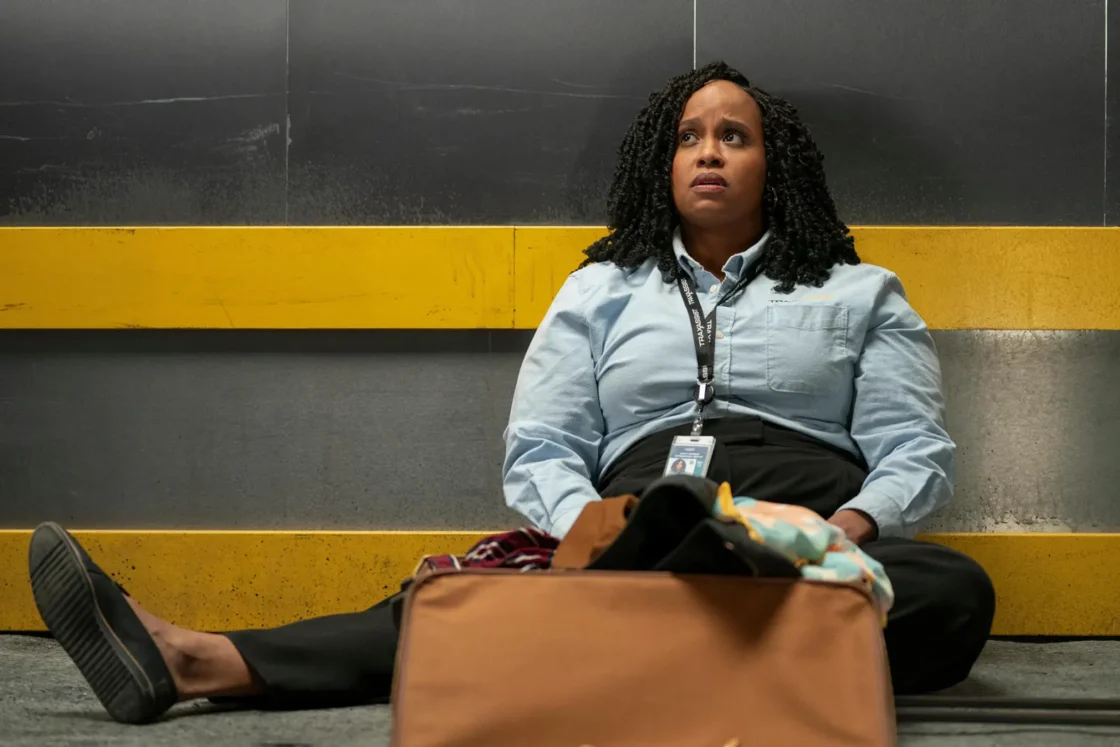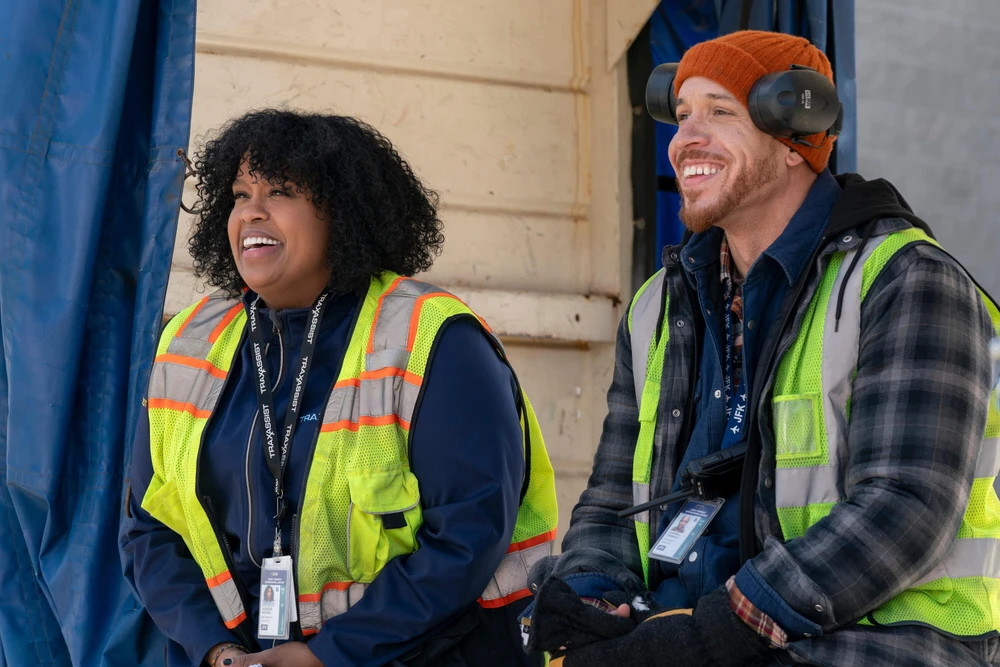Natasha Rothwell’s remarkable series “How to Die Alone” on Hulu/Onyx Collective is a true standout—effortlessly blending heartwarming moments with laugh-out-loud comedy. In collaboration with Vera Santamaria, known for her work on PEN15 and Orange Is the New Black, Natasha delivers a show that strikes the perfect balance between humor and emotional depth. We had the opportunity to sit down with Vera to discuss the series, her partnership with Natasha, and the exciting possibility of future seasons.
Premise
At the core of How to Die Alone is Mel, a character whose everyday struggles and imperfections make her incredibly relatable. As a cart driver at JFK Airport, she watches travelers embark on new adventures while she remains stuck in her mundane routine. Her lingering feelings for her ex-boyfriend Alex—who also happens to be her coworker—only add to her sense of isolation and emotional conflict.
Reflecting on their creative process, Vera Santamaria shared, “Natasha and I knew we wanted to craft something thoughtful, elevated, and genuinely funny—a show that could weave together moments of gravity and levity with ease.” She added, “We both became the guardians of that tone, and I think that’s how we made it work so seamlessly.”

A Masterful Blend of Humor and Drama
One of the show’s greatest strengths lies in its seamless integration of comedy and drama. Rothwell’s deft writing and acting prowess allow her to navigate the intricate emotional landscapes of Mel’s life with remarkable finesse. From the absurdly hilarious moments, such as the hospital doctors’ fixation on the origins of Crab Rangoon, to the raw and poignant scenes exploring Mel’s strained relationships, the series maintains a delicate balance that feels authentic and relatable.
Natasha Rothwell’s “It Factor”
“How to Die Alone” serves as a remarkable showcase for Natasha Rothwell’s multifaceted talents. As the creator and star of the series, she seamlessly transitions between comedy and drama, delivering Emmy-worthy performances that imbue Mel with depth and authenticity. Rothwell’s ability to navigate the complexities of her character, from selfishness to empathy, is a testament to her acting prowess.
Vera Santamaria spoke about her co-showrunner, saying, “She’s insanely talented—there’s nothing she can’t do, whether it’s performing or being a businesswoman. She really can juggle a lot. Seeing her enjoyment and love for getting into the details and putting her fingerprints on every element of the show was really inspiring. Her passion is really infectious”.

Themes and Writing
Beneath the humor and quirky scenarios, “How to Die Alone” delves into profound themes of self-love and personal growth. Throughout the season, viewers witness Mel’s struggles to break free from her solitary existence, make new connections, and find fulfillment. Her mistakes and missteps along the way are portrayed with honesty and vulnerability, resonating with the universal human experience of growth and self-acceptance.
We see this come to a peak in the penultimate episode (Episode 7). Vera spoke about writing the episode and the energy in the writers’ room. She said, “We obviously had an incredible writers’ room, and as an EP and Co-Showrunner, I wanted to write an episode, but it had to be later in the season. All of our episodes are a group effort, and that one was no exception.”
Representation and Authenticity
One of the series’ standout qualities is its commitment to authentic representation. Rothwell’s portrayal of a plus-sized Black woman navigating the complexities of love, self-worth, and personal aspirations is a refreshing departure from stereotypical depictions. The show’s ability to explore this experience with nuance and depth is both commendable and necessary.
Furthermore, the diverse ensemble cast and the exploration of various cultural backgrounds and experiences contribute to the show’s authenticity. From Mel’s strained relationship with her brother Brian to the poignant Thanksgiving episode that delves into familial dynamics, the series offers a rich tapestry of perspectives and narratives.

A Groundbreaking Series for Representation and Storytelling
“How to Die Alone” is not just another comedy series; it’s a groundbreaking work of art that pushes the boundaries of representation and storytelling. Rothwell and Santamaria’s vision have created a platform for diverse narratives and perspectives, challenging traditional norms and paving the way for more inclusive and authentic storytelling.
The show’s success lies in its ability to resonate with a wide audience while simultaneously celebrating the unique experiences of marginalized communities. By offering a fresh and nuanced portrayal of a plus-sized Black woman’s journey, “How to Die Alone” has set a new standard for representation and storytelling in the entertainment industry.
Potential Future Seasons
Vera Santamaria hinted at the exciting possibilities for How to Die Alone beyond its debut season, saying, “I can share that we have a very clear vision for season 2 and beyond. What excites us most is that the story unfolds in four distinct chapters, each one offering a completely unique experience. Every chapter dives deeper into Mel’s character, exploring the complexities of loneliness versus being alone.”
How to Die Alone is a rare gem, delivering a refreshingly honest and layered depiction of life’s emotional highs and lows. Natasha Rothwell’s brilliant storytelling, combined with her remarkable acting and a standout supporting cast, has crafted a series that is both deeply touching and wildly funny. Catch the first four episodes of How to Die Alone when it premieres on Hulu on September 13.
